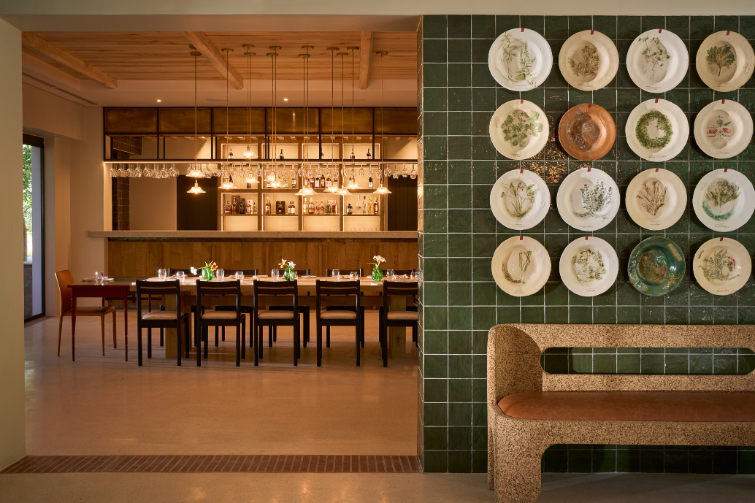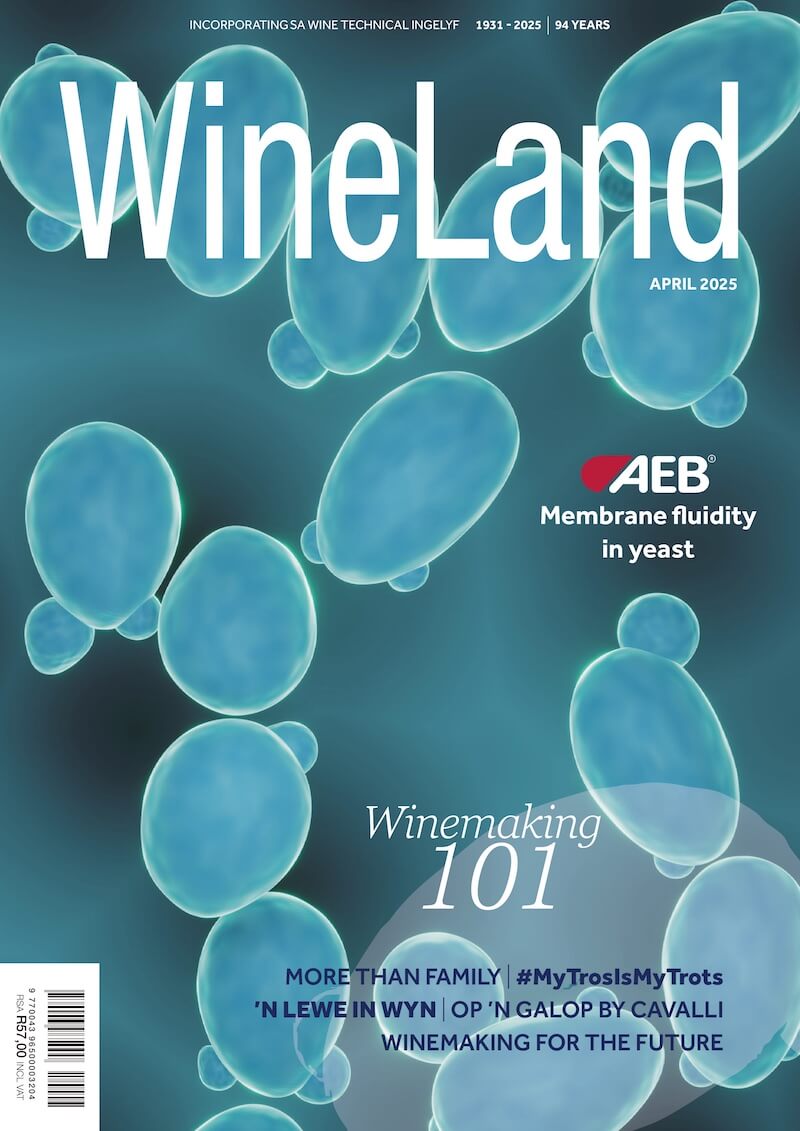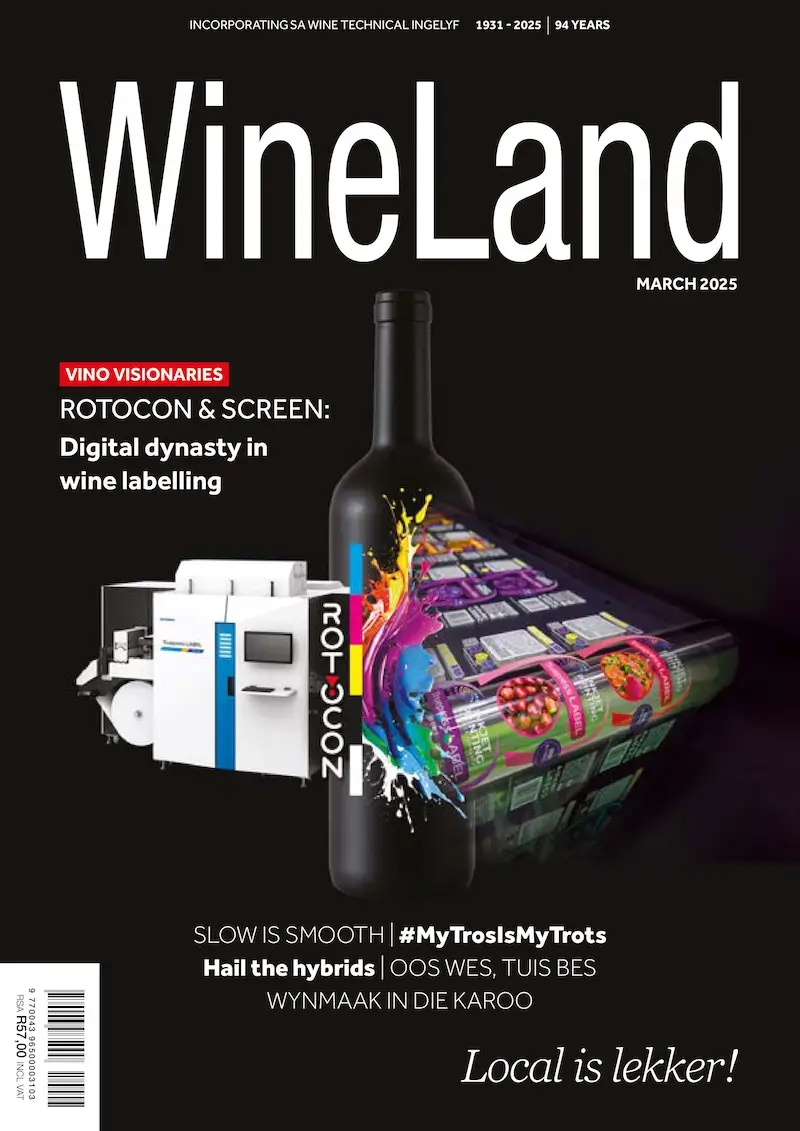Alex Dale is best known as one of the original founders of Radford Dale, which he began in 1998 with Ben Radford. He’s been pioneering sustainable agriculture and minimal intervention winemaking ever since – most recently at their new certified organic winery in Elgin, where he will be producing the country’s first organic Gamay.
Alex was born into a winemaking family and spent much of his youth working in Burgundy and Beaujolais. In 1982, at the tender age of 15, he completed his first harvest there and continued to live in Burgundy until the age of 29. “I grew up in a wine family (I am the fourth generation) from the UK who imported and distributed Cru Beaujolais, among others,” he recalls. “Indeed, my father even owned a particularly fancy French restaurant called Juliénas in the village we lived in, near Windsor, when I was small.”
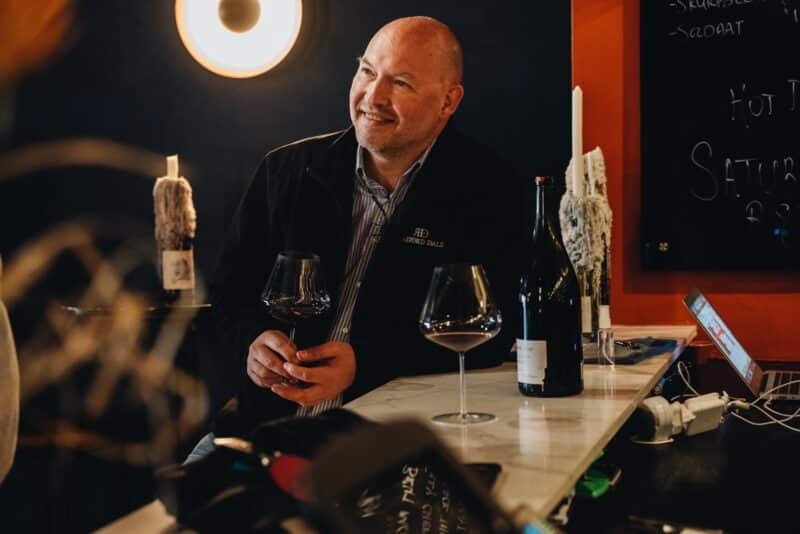
Alex Dale, founder of Radford Dale.
Beaujolais days
The family-owned wine bar in Burgundy ran an auction on the release of the first glass of Beaujolais Nouveau each year. “We were in the Guinness Book of Records (possibly still are?) for selling the most expensive glass of wine in the world – a Beaujolais – repeatedly. I even have the first Guinness Book of Records certificate for this in our Radford Dale tasting room.”
Beaujolais and Gamay are therefore deeply embedded in Alex’s personal wine journey. “My dog is even called Gamay!” Since 2010, Radford Dale has established a portfolio of over 70 Beaujolais wines, nearly all Crus, for import into SA. “As far as I can tell, our closest competitor brings in one,” says Alex.
“This selection spans the ten Crus of Northern Beaujolais, which often bear striking resemblance to our own granitic soils, in similar climatic conditions. Especially on the coastal side of Stellenbosch and at altitude in cooler Elgin.”
That explains Alex’s interest in the Polkadraai and in Elgin, and Radford Dale will be planting on the Helderberg in 2024.
Ever the maverick
Alex moved to South Africa after Nelson Mandela was elected as president, in 1994. Since then, he and his team have focused on sites, varieties and methods he believes to be in harmony with the soil and climate’s potential for nature-driven wines, as opposed to winemaker or ‘aspiration-driven’ wines. “[Such wines] are so often Bordeaux-centric here in South Africa, which I believe to be a misplaced ideology!”
This singular focus from early on sent Radford Dale down a path that often diverged from many of its peers. “We focused on premium Chenin Blanc from the outset, in the mid-nineties, when it was outlandish to do so. We sought out parcels of dry-land bush vines in the Swartland in the early 2000s when only The Observatory and Spice Route had made a name for themselves.”
Eben Sadie, then winemaker at Spice Route, introduced Alex to growers in the area, leading to his first Swartland blends during the 2004 vintage. Alex also became interested in the cool climate of Elgin for Pinot Noir around that time, first making wine from the region in 2004 with early plantings of Dijon clones as opposed to the Swiss and Champagne clones that were dominant at the time.
Back in Stellenbosch, Alex and his team focused on producing lighter style reds and naturally high acidity whites with restrained alcohols. This was the height of the Robert Parker era, when big, bold wines were popular and widely produced everywhere in the Cape.
“Since 2012, we’ve been working on developing organic viticulture and winemaking within our ranges, culminating in investing in an established, leading organic estate in Elgin, which is now our home, again at a time where commitment to organic practices is neither seen as a priority in our viticulture in South Africa (as opposed to many leading wine regions of the world where it has gained enormous traction), nor considered a financial risk worth taking,” he says. “Yet we have doubled down and fully taken the leap – in very challenging economic times, to boot.”
Natural progression
“Our determination to produce refreshing, balanced reds has, over the past two decades, inexorably brought us to grapes like Cinsault (before its recent revival), to a new-style ‘Beaujolaisesque’ Pinotage, and, finally, to Gamay.”
“We painstakingly sought out any Gamay we could locate – no easy task – before setting out to revitalise what were, invariably, neglected and unappreciated vines, bearing thus unwanted fruit. Ultimately this led us to engage a negotiation with nursery partners to reintroduce Gamay material into the nursery system, as the grape had not been planted here for two decades and was in the process of becoming extinct in SA.”
Ten years later, with the 2022 vintage, Radford Dale was able to proudly declare a Gamay, made predominantly from grapes grown on vines they had planted themselves. “We’re planting one or two new blocks now every year, between our own organic vineyard in Elgin (which reminds me of Chiroubles) to the Polkadraai Hills (the fruit from which reminds me of Fleurie) and to the Helderberg (which I speculate/hope could be like St. Amour).”
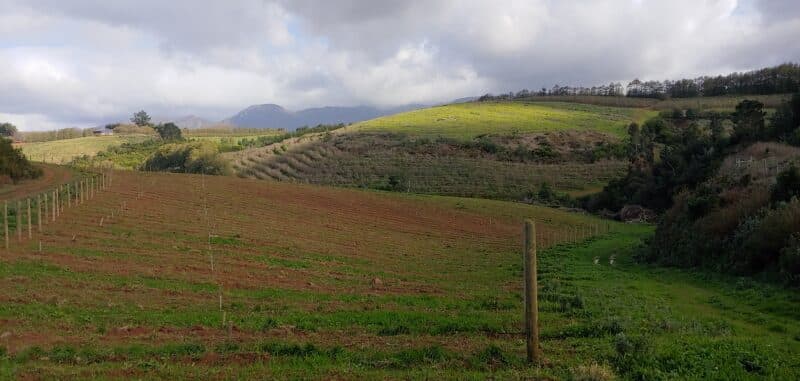
New Gamay vineyards at Radford Dale Organic.
Setting trends
Imitation is the sincerest form of flattery, and Alex’s good friend Paul Cluver has also begun planting Gamay on his estate in Elgin. But this time is different, says Alex.
“In the past, our often pioneering ventures have been obscured by subsequent mass adoption and, usually, credited to others. But with Gamay, there’s nobody else – and we are responsible for the majority of the (few) vineyards which exist now. So, we have an opportunity to make our specialty known and to lead with this underdog varietal in South Africa.”
“Radford Dale’s long-standing slogan has always been It’s all about individuality. In all we do and in how we think, to what we produce and in what we drink, this ethos is the determining factor. Gamay gives us a clear medium with which to articulate this. At a time where the drinking public has flipped from pursuing overly extracted monstrosities, favoured during the Parker era, to consuming lighter, more balanced and fresher styles, irreversibly there is a strong movement towards the types of wines we have always favoured.
With this, one of our top overseas importers recently quipped to me, ‘25 years into your journey, Radford Dale has become an overnight success!’”
